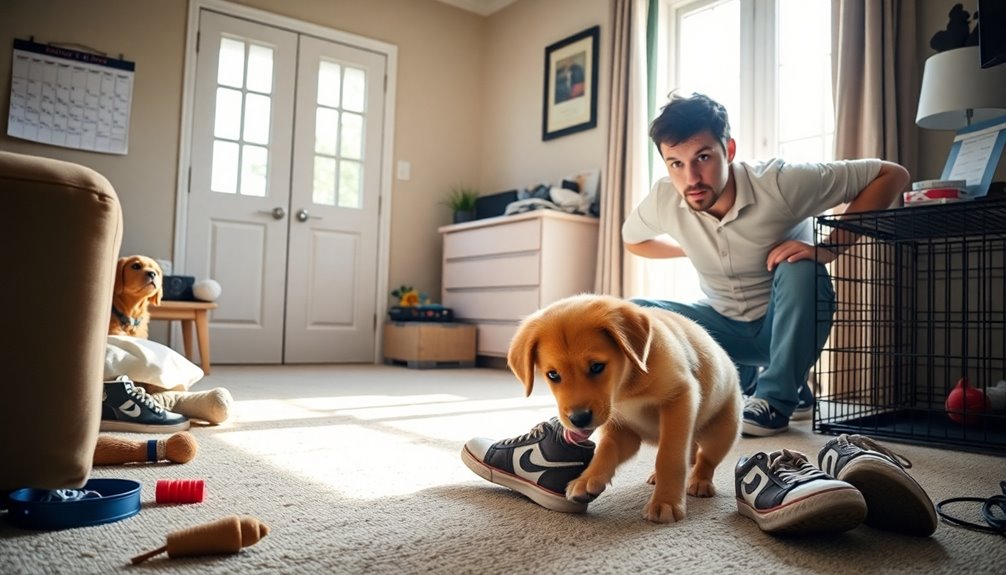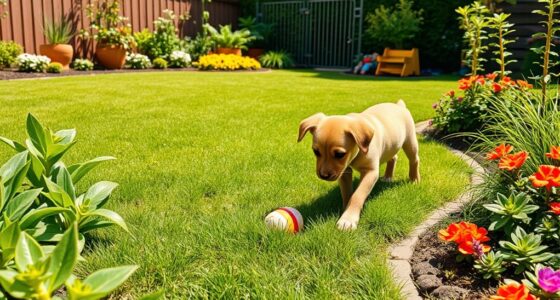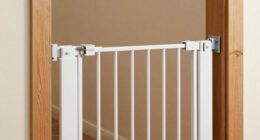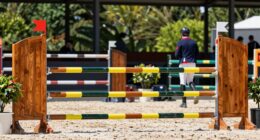New puppy owners often make mistakes that can affect their furry friends' health and happiness. Don't underestimate the financial commitment; initial costs and ongoing vet bills can add up quickly. Start training early to instill good behavior, and don't skip essential vaccines or preventive care. Keep an eye on dental health and guarantee proper nutrition, as food choices matter. Socialization is significant for developing a confident pup, and you need to dedicate time and attention to them each day. Understanding these pitfalls can guide you in creating a joyful experience for both you and your new companion. Discover more key tips ahead!
Key Takeaways
- Neglecting early training and socialization can lead to behavioral issues; start training sessions between 8 to 12 weeks for the best results.
- Skipping vaccinations and preventive care increases health risks; ensure vaccinations are completed within the first 16 weeks and maintain regular vet visits.
- Failing to budget for initial and ongoing costs can result in financial strain; anticipate expenses exceeding $1,000 annually for care and supplies.
- Ignoring nutrition can affect your puppy's growth and health; consult a vet for a proper diet and monitor feeding to prevent obesity.
- Overlooking safety measures, like microchipping and secure environments, can lead to lost pets; always ensure proper identification and monitor outdoor activities.

ZUMEHU Dog Talking Buttons, 6 Colors Dog Buttons for Communication with Training Clicker & 25 Stickers, Recordable Buttons to Help Your Dog Talk, Pet Training Starter Set for Puppy, Cats and Dogs
✅ 30s Clear Voice Recording & Loud Playback Each dog communication button features a powerful 0.5W speaker, delivering…
As an affiliate, we earn on qualifying purchases.
As an affiliate, we earn on qualifying purchases.
Not Budgeting for Expenses

One common mistake new puppy owners make isn't budgeting for expenses. Many underestimate initial adoption fees, which can range from $50 to $500. This initial expense is just the tip of the iceberg.
As you welcome your new furry friend, you'll quickly realize that vet costs can accumulate fast. Routine vaccinations alone can set you back $75 to $200 in the first year.
Additionally, don't forget about basic supplies. Food, bedding, toys, and grooming tools can add up to $300 to $500 in those first few months.
The breed and size of your puppy will also affect ongoing expenses, as larger breeds typically require more food and incur higher medical costs.
To avoid financial surprises, consider using dog ownership calculators that help estimate total costs, often exceeding $1,000 annually for the first few years.
Planning ahead and budgeting for these expenses will guarantee you provide the best care for your new puppy while keeping your finances in check.

Dog Tag Art Microchip Alert Personalized Pet ID Tag for Dogs, Silent Polymer Coated Dog Tag with Personalized Identification Information – Large 1.25" Diameter
As an affiliate, we earn on qualifying purchases.
As an affiliate, we earn on qualifying purchases.
Delaying Puppy Training

Delaying puppy training can lead to bad habits that are tough to break later on.
By starting early and being consistent, you'll help your puppy learn essential commands and navigate their world confidently.
Don't wait—begin training between 8 to 12 weeks to set your furry friend up for success.
Start Training Early
Starting training as soon as you bring your puppy home is essential for setting a solid foundation for good behavior. Puppies are most receptive to learning between 8 and 16 weeks, making this period critical for teaching basic commands and socialization. If you delay training, you risk establishing unwanted behaviors that can be tough to correct later on.
When you start training early, incorporate positive reinforcement techniques to build trust and encourage desired behaviors. Rewarding your puppy for good behavior reinforces that learning is fun and rewarding. This approach helps you avoid common mistakes, such as assuming your puppy will naturally understand what you want.
Engaging in training from day one not only fosters obedience but also creates a strong bond between you and your puppy, enhancing your overall companionship.
Consistent training sessions are key to making this process effective. Remember, the earlier you start, the better equipped your puppy will be to navigate their new world.
Consistency Is Key
Training your puppy consistently from the beginning sets the stage for a well-behaved companion. Delaying puppy training can lead to the development of bad habits that become ingrained by six months of age.
During the essential socialization period, which occurs between 8 and 16 weeks, your puppy is most receptive to learning. This is the perfect time for early training, as it helps prevent behavioral problems later on.
Establishing a routine for training sessions is vital. Regular potty breaks and consistent commands reinforce desired behaviors, ensuring quicker learning outcomes.
By being consistent, you not only teach your puppy effectively but also strengthen the bond between you both. This bond fosters your puppy's confidence and adaptability in various situations.
Moreover, early training and socialization can greatly reduce the chances of anxiety and fearfulness in adult dogs. When your puppy is exposed to different people, pets, and environments during their formative weeks, they grow accustomed to new experiences.
Prevent Bad Habits
Puppies thrive on structure and routine, so putting off their training can lead to bad habits that are tough to break. Delaying puppy training means allowing undesirable behaviors to establish, making it more challenging to correct them later.
Start training as soon as you bring your puppy home, focusing on basic commands and socialization. This early intervention is essential for preventing bad habits from forming.
The ideal window for learning is between 8 to 16 weeks, so don't miss this pivotal period. If you postpone training, your puppy may become set in their ways, leading to frustration for both of you.
Consistent training sessions keep your puppy engaged, while delaying can result in confusion and inconsistency in behavior.
Establish a structured routine that includes training times, potty breaks, and commands. This structure not only aids learning but also fosters a trusting relationship between you and your puppy.
Remember, the sooner you start puppy training, the better equipped your pup will be to develop good habits and skills that will last a lifetime.
Don't wait—begin training today to prevent bad habits from taking hold!
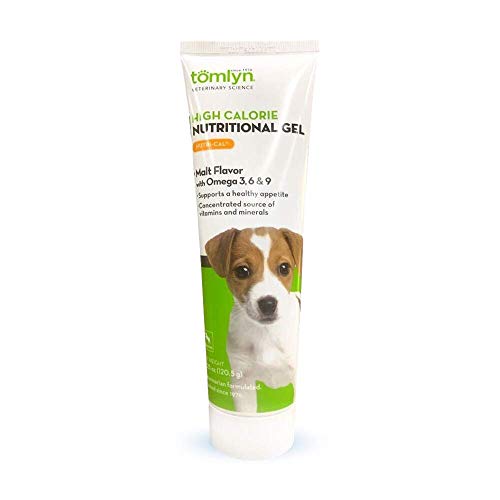
Tomlyn High Calorie Nutritional Gel for Puppies, (Nutri-Cal) 4.25 oz
Nutritional oral gel for puppies who need extra calories and vitamins; ideal for pets refusing food
As an affiliate, we earn on qualifying purchases.
As an affiliate, we earn on qualifying purchases.
Missing Vaccines and Vet Visits
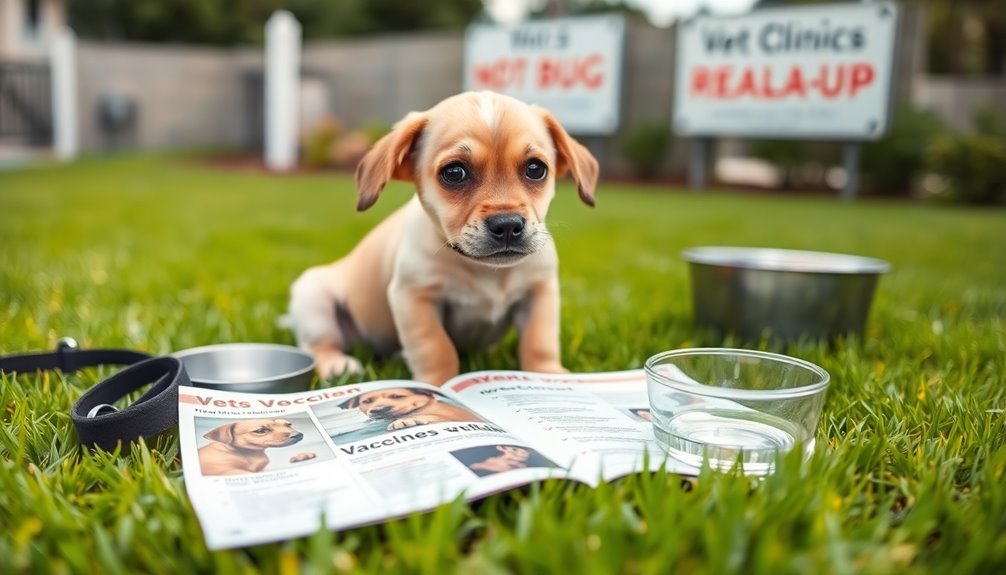
In the essential early weeks of your new puppy's life, regular vet visits are important for monitoring health and guaranteeing vaccinations are on schedule. Puppies need a series of vaccinations within their first 16 weeks to build immunity against dangerous diseases like parvovirus, distemper, and rabies. Missing these vaccinations can leave your puppy vulnerable to serious health issues, resulting in costly treatments and long-term complications.
It's important to establish a consistent relationship with a veterinarian to keep your puppy's health on track. A six-month checkup is crucial for evaluating growth and development, as well as administering booster shots for those initial vaccinations.
Remember, early veterinary care not only helps protect your puppy but also lays the foundation for a healthy life.
Different adoption sources may have varying vaccination schedules, so you must stay informed and proactive about your puppy's health needs. By prioritizing timely vet visits and vaccinations, you safeguard your furry friend against preventable diseases and make sure they're on the path to a happy, healthy life.
Don't overlook this essential aspect of puppy ownership; it's one mistake you won't want to make.

Arm & Hammer for Pets Tartar Control Dog Dental Care Kit, Dog Toothpaste Kit with Toothbrush and Finger Brush for Oral Hygiene and Fresh Breath Care, Banana Mint Flavor, 2.5 oz, 3-Piece Kit
COMPLETE DOG DENTAL KIT: Includes dog toothpaste, a double-sided toothbrush, and a finger brush to support regular oral…
As an affiliate, we earn on qualifying purchases.
As an affiliate, we earn on qualifying purchases.
Overlooking Dental Health

Neglecting your puppy's dental health can lead to serious problems down the line, much like skipping vaccinations.
As a responsible puppy parent, you want to guarantee your furry friend enjoys a lifetime of overall health. Poor dental hygiene can result in gum disease and even tooth loss by the age of three, so it's crucial to take action early.
Here are some essential steps to keep your puppy's dental health in check:
- Introduce safe chew toys that promote healthy dental development during teething (2 to 10 weeks).
- Brush your puppy's teeth regularly, starting as early as possible to make it a routine.
- Schedule annual dental exams with your veterinarian to catch issues early.
- Offer chew toys specifically designed for dental health to reduce plaque and satisfy your puppy's natural chewing instincts.
Skipping Preventive Medications

When you bring a puppy home, skipping preventive medications can put their health at serious risk.
Understanding the types of treatments available and sticking to a schedule is essential, as regular vet visits can help guarantee your puppy stays protected from harmful parasites.
Don't underestimate the importance of preventive care; it's far more cost-effective than treating the diseases that can arise from neglect.
Understanding Preventive Medications
Preventive medications are essential for your puppy's health, yet many new owners mistakenly skip them. By neglecting these treatments, you're risking your puppy's well-being. Fleas, ticks, and heartworm can lead to severe health issues that are avoidable with proper care.
Consider the following risks of skipping preventive medications:
- Flea infestations that cause itching and skin infections
- Tick bites that can transmit diseases like Lyme disease
- Heartworm exposure leading to severe lung damage and heart failure
- Higher veterinary bills for treating preventable conditions
Investing in preventive medications, such as monthly heartworm treatments and regular flea and tick control, can save you from costly vet visits down the line.
It's recommended to start these treatments at a young age.
Make certain to schedule regular consultations with your veterinarian. They'll help determine the right type and timing of preventive medications based on your puppy's age, breed, and local risk factors.
Importance of Regular Vet Visits
Many new puppy owners underestimate the importance of regular vet visits, which play a significant role in guaranteeing your furry friend stays healthy.
These appointments are essential during your puppy's first 16 weeks, as they help monitor growth, administer necessary vaccinations, and identify any potential health issues early on. Skipping these visits can leave your puppy vulnerable to preventable diseases like parvovirus and distemper, which are easily avoidable with timely vaccinations.
Regular vet visits also set the stage for preventive care. Discussing flea, tick, and heartworm medications with your vet confirms your puppy is protected against serious health risks associated with these parasites.
Additionally, establishing a routine for annual dental exams from a young age helps prevent dental issues that can arise as your dog ages.
Types of Preventive Treatments
Skipping preventive medications can have dire consequences for your puppy's health. Fleas, ticks, and heartworms pose significant risks that can lead to serious conditions if left untreated. By ensuring your puppy receives proper preventive treatments, you can protect them from costly veterinary bills and painful health issues down the line.
Consider these preventive measures:
- Flea and tick prevention: Start as early as 8 weeks old to keep your puppy itch-free and healthy.
- Heartworm prevention: Recommended from 6-8 weeks, this treatment is essential for avoiding fatal heartworm disease.
- Regular vet check-ups: Tailor your puppy's preventive treatments based on their age, breed, and lifestyle.
- Education on symptoms: Recognizing early signs of infestations can save your puppy from severe complications.
Neglecting these vital preventive treatments can lead to anemia, skin infections, and even death. Consequently, always consult your veterinarian to establish the right plan for your furry friend.
Prioritizing preventive care is one of the best decisions you can make as a responsible puppy owner.
Not Researching Puppy Food

One of a new puppy owner's biggest mistakes isn't researching puppy food thoroughly. Proper nutrition is vital for your pup's growth and development, and it's important to understand that puppies have high protein and fat requirements, which differ markedly from adult dog food. Feeding your puppy adult food can lead to deficiencies or health problems since it may not provide the necessary nutrients for their development.
Consulting a veterinarian can help you identify your puppy's specific dietary needs, ensuring the chosen puppy food meets important nutritional standards. Look for packaging that states "complete and balanced," which confirms that the food adheres to AAFCO (Association of American Feed Control Officials) nutritional guidelines for puppies.
Investing in high-quality puppy food not only boosts your pup's overall health but can also prevent common ailments, potentially saving you from future vet bills.
Don't underestimate the significance of nutrition; make informed choices to set your puppy up for a healthy life. By prioritizing the right puppy food, you'll be taking a notable step in ensuring your furry friend thrives.
Incorrect Feeding Amounts

Getting the feeding amounts right for your puppy is critical for their growth and overall health. Puppies require specific nutrients to thrive, and incorrect feeding amounts can lead to problems like obesity or malnutrition. Always consult your veterinarian for personalized recommendations based on your puppy's breed, age, and size.
To keep your puppy healthy, consider these points:
- Monitor their weight regularly to guarantee they're on track.
- Feel their ribs; you should be able to do this without excess body fat covering them.
- Adjust portions according to their activity level and growth progress.
- Follow feeding guidelines on the puppy food packaging but be flexible as needed.
Puppies typically need more calories than adult dogs, so high-quality puppy food designed for growth is essential. Overfeeding can lead to serious health risks, so being vigilant about the correct feeding amounts is crucial.
Neglecting Socialization

Neglecting socialization during your puppy's critical period, between 8 and 16 weeks, can lead to fearfulness and aggression later in life.
It's crucial to gradually expose your puppy to different people, environments, and experiences to foster adaptability and confidence.
Regular interactions, like puppy classes, can set the foundation for a well-adjusted adult dog.
Critical Socialization Period
During the vital socialization period, which spans from 8 to 16 weeks of age, it's important to expose your puppy to a variety of experiences. This early socialization shapes your puppy's behavior and helps them grow into a well-adjusted adult dog.
Neglecting this important phase can lead to fearfulness or aggression later on, making it harder for your dog to adapt to new situations.
To guarantee your puppy develops confidence and social skills, consider introducing them to:
- Different types of people (men, women, children)
- Various pets (cats, other dogs, small animals)
- Unique environments (parks, busy streets, stores)
- New sounds and textures (cars, vacuum cleaners, grass)
Attending puppy classes can also enhance your pup's socialization, allowing for safe interactions with other dogs and people.
Daily exposure to diverse stimuli not only builds their confidence but also helps them develop healthy behaviors.
Gradual Exposure Importance
Socialization is essential for your puppy's development, and gradual exposure to new environments, people, and pets plays a significant role in shaping their future behavior.
During the vital socialization period (8 to 16 weeks), it's important to introduce your puppy to a variety of stimuli. This helps prevent fearfulness and anxiety as they grow into adults.
Underestimating Attention Needs

Puppies thrive on attention and interaction, and underestimating their needs can lead to serious behavioral issues. As an owner, it's vital to recognize that your puppy requires significant care and companionship. Failing to provide this can result in separation anxiety and destructive behaviors.
To guarantee your puppy develops into a well-adjusted adult dog, consider these key aspects of attention:
- Daily playtime that gets them moving and engaged.
- Consistent training sessions that stimulate their minds.
- Socialization opportunities with other dogs and people.
- Structured routines that help manage their energy levels.
Engaging with your puppy in regular walks and interactive play is important for their physical and mental well-being. This prevents excess energy from turning into mischief or anxiety.
If you're busy, think about options like doggy daycare or hiring a dog walker to maintain the necessary attention levels when you can't.
Failing to Invest in Protection

Providing your puppy with attention and care is just one part of responsible ownership; you also need to invest in their protection. One of the best ways to do this is by microchipping your puppy. This permanent form of identification greatly boosts the chances of being reunited if they get lost—microchipped pets are 20 times more likely to return home.
Additionally, consider health insurance for puppies. Veterinary costs can average $1,000 per year, and having insurance can save you from unexpected financial burdens during emergencies. Regular vaccinations and preventive care are essential, too; they protect against common diseases that can be far more expensive to treat.
Don't forget about the importance of a quality collar and ID tag. Make certain your puppy can be easily identified if they escape, as an estimated 10 million pets are lost in the U.S. each year.
Lastly, investing in pet liability insurance protects you financially if your puppy causes injury or damage. This coverage can help you avoid costly legal fees and medical expenses, making sure both you and your furry friend are safeguarded.
Frequently Asked Questions
What Not to Do When You Get a New Puppy?
When you get a new puppy, don't neglect early training and socialization.
It's essential to start teaching commands and exposing them to different environments early on.
Avoid inconsistent potty training methods, as they can confuse your puppy and prolong accidents.
Don't overlook the importance of crate training; it offers a safe space and helps with housetraining.
Finally, make sure you're feeding high-quality puppy food to support their growth and health.
What Is the Puppy 1/2 Rule?
The Puppy 1/2 Rule is like a roadmap to a happy, energetic companion. For every month your puppy is old, give 'em an hour of exercise daily, broken into playful sessions.
So, if you've got a 3-month-old, aim for 1.5 hours of fun, including walks and play. Adjust based on your puppy's breed and energy level.
This routine keeps 'em fit and mentally stimulated, paving the way for a well-rounded pup!
What Is the Rule of 3 for a New Puppy?
The Rule of 3 is essential for understanding your new puppy's adjustment. In the first three days, your puppy settles into their new home, so create a calm environment.
The next three weeks focus on establishing routines, including basic training and boundaries.
Finally, during the first three months, prioritize socialization by exposing your puppy to various people, places, and pets. This structured approach helps your puppy feel secure and confident as they grow.
How Traumatic Is It for a Puppy to Change Owners?
Changing owners can be pretty traumatic for a puppy. It disrupts their familiar environment and routine, leading to anxiety and confusion.
You'll notice signs of distress like fear or withdrawal, especially during their critical socialization period.
To help your new puppy adjust, provide a stable, supportive environment and gradually introduce new experiences.
Keeping a consistent routine will help them feel secure, making the adjustment smoother for both of you.
Conclusion
In the journey of puppy ownership, avoiding these common mistakes can save you from a world of heartache. Remember, a happy puppy means a happy home. By budgeting wisely, prioritizing training, and keeping up with health needs, you'll not only nurture a thriving companion but also enjoy a bond that's as rewarding as gold. So, roll up your sleeves and embrace the adventure—your furry friend is counting on you to be the best pup parent you can be!

